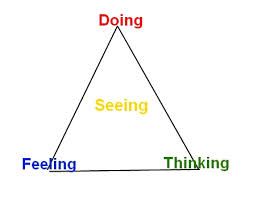
Punishment
Living Well Can Be the Best Revenge
Paying dues and looking for rewards
Posted April 25, 2015
Introduction:
While working on my doctoral dissertation at the University of Texas at Austin, I relaxed by driving about the Hill Country of central Texas in my Oldsmobile Convertible. I needed to relax. I was pursuing "interdisciplinary" research involving the disciplines of psychology, biochemistry, computer science, statistics, and biomedical engineering. These days it would be called an "integrated science" project. At the time this followed on the heels of having been the co-author of two articles appearing in the prestigeous Proceedings of the National Academy of Sciences.
http://www.pnas.org/content/51/5/866.full.pdf
I relaxed experiencing burnt-orange sunsets, bluebonnets in spring, invigorating fall weather after hot Texas summers, perpetual night breezes common to the Southwest, picnics under "the stars at night big and bright" without mosquitoes. Even the rush to close the top at the first signs of a “Blue Norther” (i.e., a sudden, ominious storm with thunder, lightening and rain unlike anything I had ever known in New England) was a welcomed change of pace!
All this was about to change. My used, shall I say preowned, convertible soon needed a rebuilt transmission, but then ran without problems. Following graduation, I drove the car and U-Haul trailer (Photo in Archive) to New York City to begin my postdoctoral internship at the Ellis Institute in Manhattan and teaching in the new doctoral psychology program at Long Island University across the East River from Wall Street. There, I would serve as Assistant then Assocatiate Professor until joining the staff of a government hospital's outpatient clinic, and began building a private practice in Manhattan.
Archive: https://www.psychologytoday.com/blog/beyond-good-and-evil
Culture Shock-From Texas to New York City:
It didn’t take long for the soft top of my Texas convertible to become slashed and shredded by vandals roaming Manhattan’s Central Park West. The replacement cost hurt on a professor’s salary, keeping in mind I had moved from Austin, known to have the lowest cost of living in the United States at the time, to Manhattan with the highest cost of living. This made "culture shock" worse! Two months later my car was stolen from the faculty parking lot. In another four months I was mugged on campus. This urban reception put an end to "living well" with a convertible for the next thirty-three years in Manhattan. The risk of losing another one was too painful even as I grew in confidence and “street smarts” needed to survive a city where law and order rise and fall on the backs of politicians and mayoral administrations.
I had encountered urban realities never studied or experienced at Amherst or Austin, or dreamed of on the Massachusetts farm where I was born and raised. I went on to survive the worst and enjoy the best the city, at the center of the world, had to offer. Practicing my chosen profession in Manhattan became a “dream practice” as mayors came and went setting the “tone” for law enforcement, and the boom and bust of business cycles came and went with little impact on my life style. I grew to love “My New York” much as others grow to love “My London,” “My Paris,” or “My Berlin.” These days, Post 911 New York is safer for residents. It is also safer for tourists who are seen as "cash cows."

Big cities with pluralistic cultures, ethnic diversity, and “projects,” designed to “warehouse” alienated, unemployed, and often drug addicted youths, are not easy to govern. Even so, I resented mayors soft on crime and their failure to protect guys like me earning an honest living. I was angry. Some of us saw patients at night. Some taught courses at night. I wanted to be safe. With the passage of time I lost myself to my profession of helping others in my private practice on Manhattan’s Upper East Side, and as Senior Staff Psychologist at the Outpatient Clinic of the Veterans Administration Hospital. I told myself “givers live longer and better lives than takers” and moved on, thankful I had ended up at the center of the world the boy had dreamed about on that farm in rural Western Massachusetts.
__________
Recently, I decided to confront this unfinished business in my life involving the traumas mentioned, and the fantasy of owning another convertible in the spirit of living well is the best revenge. It was April and reading an article about the Mercedes automobile in the March 2015 issue of Mercedes Enthusiast, a British magazine, I decided to buy one! It had to be "preowned" to satisfy my pocketbook, and aesthetic tastes. I preferred the style of older models without the look of "Boxes," "Bubbles," or designs inspired by "Hollywood" or "Focus Groups!"
I had previously rejected German and American cars in favor of more reliable Japanese cars. Living in Northern Virginia, an interesting mix of Texas and Manhattan near Washington, D.C., I felt the time was ripe for a convertible, and having convinced myself the reliability of German cars had improved, I began my search. I admit wanting to recapture my youth and college days, and the desire to overcome any car envy, and resolve the trauma of having lost my first convertible to urban vandals, hoodlums, hooligans, brigands, crooks, robbers, villains, pillagers, barbarians, outlaws, evildoers, goons, ruffians, thugs, nincompoops, or whatever the anonymous “they” or “them” are called these days!
Note: It was the American politician and sociologist Daniel Patrick Moynihan (March 16, 1927 – March 26, 2003) who got it right when it came to understanding such urban realities now spreading to the wider world! He was elected to the United States Senate from New York in 1976, 1982, 1988, and 1994, and served as a member of four presidential administrations. I wish more had listened to him!
__________
I was mugged, meaning attacked and robbed in a public place! Has this ever happened to you? It took place on an urban college campus before mastering the street smarts needed to survive the changing "climate" of law enforcement and public safety. I have more to report. My roomate at the time, also a post-doctoral, clinical intern, at the Ellis Institute was mugged near my faculty apartment building. My department Chairman Professor Gilbert, who had hired me, was mugged a year later getting his car from the same faculty parking lot where mine was stolen. (Note: Professor, Chairman Gilbert was formerly Chief Psychologist at the Nuremberg Trials following World War II. He authored such books as The Psychology of Dictatorship and Nuremberg Diary). He was fluent in German, fought in World War II, interviewed and tested Nazi prisoners on trial, and was never mugged throughout the war. Chairman Gilbert fell victim to one of the city’s “bad mayors").
There is more! My friend and radio personality Dr. Carlton Fredericks was mugged off Times Square in broad daylight while approaching WOR studios to broadcast his popular Design for Living. I recall he lost no time retreating to a make-shift studio at his suburban home. Together, he and I, and a group of progressive physicians, together with Professors R. J. Williams and Linus Pauling, would go on to organized the world’s first preventive medicine society for doctors only (The International Academy of Preventive Medicine, and I was elected their first Ph.D. President). Those of us surviving mayoral administrations weak on crime, the FBI handled organized crime, grew to appreciate the meaning of living well is the best revenge.
A Car Guy Heals Himself:
In my search for the perfect Mercedes I was influenced by that article in the British magazine about the CLK 320 Mercedes. It suggested the 2005 model was a very “appealing buy that is still young enough to feel perfectly modern, but old enough to be affordable, and make summer motoring a joy.” I then discovered and fell in love with a low mileage Silver Mercedes specimen at Arlington near Washington, D.C. However, it failed the obligatory PPI or “pre-purchase-inspection” by my mechanic who reported too many mechanical wrongs with this cosmetically right car. I couldn’t understand how a car with such low mileage could have so many mysterious problems. Car Fax revealed nothing! It was another example of the old adage “you can’t judge a book by its cover.” I had to fall out of love after falling in love.
I then searched the web ads and ended up driving around Pennsylvania, Maryland, and Virginia until two popped up in Richmond. They sounded promising over the phone. I requested a “curtesy hold” of 48 hours to fend off others with spring fever wanting what I wanted. I immediately drove to Richmond prepared to overnight at a hotel. By now I was tired of searching. I was ready to give up. You can imagine the excitement of discovering the first car lived up to the salesman's pitch. It was a one owner with very low mileage…at thirty some thousand miles it was hardly "broken in" by Mercedes standards and it was the model I had read about. The protective plastic sheet covering the floor mat hadn’t been removed. The problem was color: it was black and chrome with a charcoal interior. I had wanted a silver one the color of my Prius. The asking price was too much, but, I found myself in the right place at the right time with others breathing down my neck. I learned to love black-with-chrome and the charcoal interior. We agreed on the asking price providing they would allow a PPI. They did, suggesting they had nothing to hide. In the end they fixed a few minor problems, mounted new Michelin tires, and I drove it back to Northern Virginia in the rain without the soft top leaking. The air conditioning was strong. I loved the way it handled! The leather smelled new! I drove home without touching any buttons and switches, and I’m now reading the two manuals (i.e., "Car" and "Command Navigation" manuals) before doing so.
.jpg?itok=TcC9zduC)
_________
Living beyond the forever changing philosophies of urban law enforcement, I have a little more confidence owning a convertible; but I know that in today’s wider and globalized world, none of us is ever far from “My New York City” in this respect.
Driving the Virginia convertible promises to help me work through the unfinished business of losing my Texas convertible under circumstances that had diluted the pure pleasure and youthful excitement of arriving New York City from Texas and fulfilling the boy’s dream. I now look forward to what the British describe as “the joy of summer motoring," and in ways that promise a revival of fading memories in the spirit of "living well is the best revenge;" borrowing an old expression attributed to George Herbert who was a popular 17th century poet. Now there is the challenge of 21st century climate change as the planet struggles to find a new equilibrium in a manner that gives rise to extreme weather events! And, Oh, I forgot to mention the heroin epidemic in "my New England," beyond the streets of "my New York," which now concerns me when I drive North.
_________
With all this in mind, I want to share two poems entitled “The Silver Mercedes” and “The Black Mercedes” by Linda Niewiadomski who is on friendly terms with my excitement these days. The poems are only slightly different in content, reflecting the results of my search for the "perfect" preowned convertible. Some will remember Linda as the poet who gave us poetic definitions of the Three Dimensions of Value and Moral Reasoning recalled below. **
The Silver Mercedes:
Please get in line
All you pretty ladies
Here comes Leon
In his Silver Mercedes
With the top down
And wind in his hair
Try and hitch a ride
Only if you dare!
Oil may be leaking
And Door handles rattle
Just enjoy the ride
But don’t you tattle!
___________________
___________________
The Black Mercedes
Please get in line
All you pretty ladies
Here comes Leon
In his Black Mercedes
With the top down
And wind in his hair
Try and hitch a ride
Only if you dare!
Chrome Lines Streaking
Rebel in the saddle
Just enjoy the ride
But don’t you tattle!
_____________________
* Footnote 1: Time Heals All Wounds
In time, I would put painful memories in the larger context of “civilization and its discontents,” a prominent theme in my blogs. Educated Discontents without moral education. Discontents enjoying the benefits of natural science without moral science. Discontents exposed to capitalism without humanism. Discontents living in civilizations without a soul because the Feeler, Doer, Thinker dimensions of values and valuations remain out of balance, and out of reach of natural science. Given the world of values and very different world of facts, this can be corrected only by developing a "new" science of values to complement and balance the "old" science of facts. The asymmetric evolution of natural science without value science remains a tragic flaw in the character of all civilizations (i.e., all six of them), and their growing number of discontents!
My earlier encounter, many years ago, with the dark side urban realities (now spreading beyond our cities) got me thinking about values and why psychology had no science of values to work with; never mind the question of clinical relevance. The subject always seemed too important to be left in the hands of religion and philosophy alone. I came to believe that a science of values is the "holy grail"of my profession, and yet my profession remains strangely silent on the subject. (I doubt anyone else is writing and blogging about value science vs. natural science; or its unusual origin in the recent convergence of psychological and philosophical thought).
Somehow the world has survived with only religious and philosophical approaches to values and morals in spite of the fact we are all prisoners of our values. Although I didn’t know where to turn years ago, the time would come when my professional life would involve pioneering, with others, an empirical, not merely theoretical, science of values that had stumped the best minds throughout the pages of history. I never imagined that one day I would be blogging about this new science beyond Good and Evil which never existed not so long ago when I was a student, then college professor. I'm speaking of a second system of science destined to balance and restrain the half-smart, asymmetric (i.e., one sided) evolution of natural science!
I suppose it was my youthful interest in General Semantics (See: People in Quandries by Wendell Johnson); the culture shock of New York City after the farm and Texas; my internship that focused on “thought styles” and “belief systems" rather than Id, Ego, Superego, behaviorism, operant conditioning; and my treatment of World War II veterans and former prisoners of war which inspired me to take values more seriously and scientifically than most psychologists.
I've always had the social psychologist Milton Rokeach on my side with thoughts like "the concept of value is the most important, least studied, and least understood concept in all of psychology.” Abraham Maslow finally rejected his earlier speculation that the concept of value might be obsolete in psychology folliowing his discovery of Hartman's contributions. The few academic studies of values by Allport, Rokeach, and Kohlberg lacked clinical relevance so far as I was concerned! I was a licensed (NY, NJ, VA) and practicing clinical psychogist, without peer support. None of them had done what I wanted to do, and there was nothing in the liteature to suggest the science of values was possible, relevant, or needed!
My long uncertainty over how to approach the study of values in a scientific and clinically relevant manner changed suddenly when serendipity, fate, destiny (or whatever we call it) struck! It involved my rediscovery of Hartman seven years after I had discovered and rejected his thory of value as an intern. This changed my professional life forever. Together with former Hartman colleagues (Hartman died in 1973), and some of his entrepreneural students, I began in 1979 the long march with them to discover a science of values which I am sure is the "Holy Grail" of psychology even though it was beyond the reach of traditional psychology and old natural science.
It took Hartman's discoveries beyond Good and Evil to give us the science of values in the world that had a science of facts! Natural science covering facts, on this side of Good and Evil, has existed since The Age of Reason (i.e., 18th Century), While it "touched" facts, natural science reached for values without "touching" them even as it perfected a scientific understanding of facts. This asymmetric evolution of one science without the other (i.e., natual science without value science) blinded psychology to values. It caused it to remain a pre-scientific discipline; for it had always emulated natural science; with clinical psychology adopting the medical model, and especially that of crisis-medicine rather preventive-medicine.
The foremost applications of our new science of values are the axiometrics or valuemetrics of The Hartman Value Profile (HVP), and Axiological Psychology which is valuecentric cognitive psychology. This is a theory and practice based on Ellis' approach to clincial psychology (Reason and Emotion in Psychotherapy and Guide to Rational Living), my association with Nathaniel Branden, Ph.D. at a time when he turned to the practice of psychology and wrote The Psychology of Self Esteem, philosopher Hartman's autobiographical Freedom to Live and Structure of Value, and my published research supporting Hartman's theory and his testing of values and valuatrions (The New Science of Axiological Psychology).
Note: Wikipedia reports that "based on a 1982 professional survey of USA and Canadian psychologists, my mentor Albert Ellis is considered the second most influential psychotherapist in history. Carl Rogers is ranked first in the survey and Sigmund Freud is ranked third."
__________
** Footnote 2: Poetic Definition of Value Dimensions Forming the Axiological Triangle, or Triaxiomatic Value-Vision, Behind All Thought-Styles:

In keeping with the old adage that anything worth saying is worth repeating, I give you Linda Niewiadomski’s poetic defnitions of the three dimensions of value vision, seeing-with-values, and moral reasoning. They are incredibly important because they are the taproots of behavior and personality and unlike Id, Ego, and Superego, and most other clincial concepts, they can be quantified and measured. Doing so yields personality profiles and clinical diagnoses empirically validated by my published research. These core dimensions are the basic concepts of axiological psychology (i.e., values-based, cognitive psychology) and axiological science. They are also basic to the new field of "philosophical counseling." They constitute the alphabet of “three letters” (F,D,T) which "writes the language" of behavior, emotions, and personality. Feeler, Doer, and Thinker orientations or mind-sets have consequences. It is the co-play and counter-play (i.e., axiological dynamism) of these dimensions that shape personality and behavior. Each dimension has "its moment in the sun" (i.e., becomes an "executive" dimension) depending on circumstances and the context of behavior.
Poetic Induction of Feeler, Doer, Thinker Consciousness: Know Your FDTs
The Feeler Self (Hartman's Intrinsic Values)
(F) Feeler value-vision is something soft and touchy which Suzy is good at:
“Suzy is a feeler / Wears her heart upon her sleeve / Empathy is her middle name / By your side, she’ll never leave!”
The Doer Self (Hartman's Extrinsic Values)
(D) Doer value-vision is action, which is something Nancy is good at:
“Nancy is always busy as a bee / Takes no time to feel or think / Her actions won’t set her free.”
(T) The Thinker Self (Hartman's Systemic Values)
Thinker value-vision is contemplative, which is something Fiona is good at:
“Fiona is analytical to the bone / Lost in thought and questioning / She spends her time alone.”
The "trick," the goal, is to be on "friendly terms" with these "cognitive dimensions" dedicated to values and valuation as habitual self-evaluators (i.e., our FDTs or IESs)...and not be "stuck" anywhere. This comes down to learning your FDTs as well as your ABCs and 123s! The earlier the better! This is "preventive psychology!" This is tomorrow's "moral education" today!
___________
© Dr. Leon Pomeroy, Ph.D.



